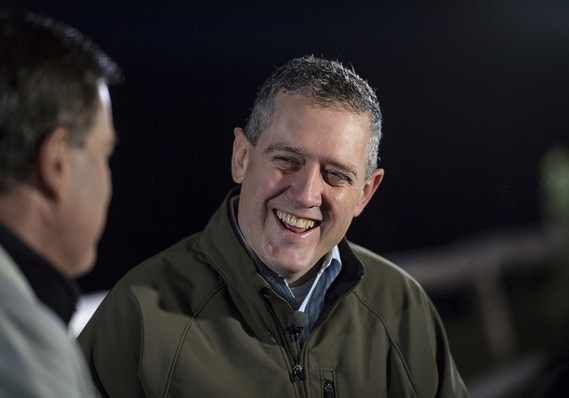 Bloomberg News/Landov
Bloomberg News/Landov
St. Louis Fed President James Bullard said Friday the central bank can handle a recession has more ammunition than it did three years ago to fight any downturn.
“At least if it was an ordinary recession, I think there would be enough tools to handle that,” Bullard said in an interview with MarketWatch. Bullard added that he thought a recession is “hopefully far from now.”
Three years ago, Fed Chairwoman Janet Yellen spoke at the Fed’s Jackson Hole and said she was confident the Fed had the tools to fight the next recession, even though short-term interest rates were so low.
“The Fed is in better shape than when she [Yellen] said that to handle a downturn,” Bullard said, on the sidelines of the latest Jackson Hole conference.
Yellen’s analysis was done when the Fed’s policy interest rates was close to zero and the Fed “has more ammunition than we had. If anything the case that was made, is stronger than it was,” he added.
Bullard said that recession probabilities are higher, but said this is mainly due to the inverted yield curve.
“I’m a little concerned about it. I don’t like the inversion of the yield curve but I think we can straighten that out,” he said, suggesting more Fed easing would raise the curve. Then recession probabilities would go down, he said.
Former U.S. Treasury Secretary Larry Summers on Thursday warned that the Fed was overconfident in its ability to handle a recession.
Read: Summers crashes Jackson Hole in tweet storm
In the wake of the 2008 financial crisis, when short-term interest rates hit zero, the market and even Fed policy makers did not know what to expect, Bullard said. The Fed ultimately decided to buy bonds to lower long-term bond yields, a program known as quantitative easing.
The next time around, “this will all be anticipated by markets” who then might react sooner and ease financial conditions, the St. Louis Fed president said.
At the moment, Bullard said that analysts are overlooking the fact that the recent drop in bond yields should help stimulate demand.
Earlier, in television interviews, Bullard said he would support more interest rate cuts after the Fed cut its policy rate on July 31 for the first time in a decade.
“We should get lower here,” Bullard said on CNBC.
“The yield curve is inverted. We’ve got one of the higher rates on the whole yield curve. That is not a good place to be,” he said.
Bullard said rate cuts would be insurance against slower-than-expected economic growth.
“How much risk are we facing from the fact that we’ve got a global manufacturing contraction going on and possibly more to come?” he asked.
“I’d like to take out more insurance against that downside risk,” he said.
If the risks “blows over,” the Fed can take back the easing steps next year, he said.
Fed Chairman Powell on Friday said the Fed was “carefully watching developments” and pledged the central bank would act as appropriate” to keep the economic expansion going.
Read: Economy in favorable place but faces significant risks, Powell says
The Fed is clearly split on the road ahead. Four Fed officials, including two voting members, have suggested they want the Fed to pause and wait and see how the economy evolves before cutting rates again.
Read: George, Harker urge Fed to hold steady
Also on Friday, Cleveland Fed President Loretta Mester said she also didn’t support the July rate cut.
Bullard is a voting member of the Fed’s interest rate setting committee. The Fed’s interest-rate committee will meet on Sept. 17-18.
Stock were volatile and then sank after Powell’s remarks to the Jackson Hole conference. The Dow Industrial Average DJIA, -1.41% was down more than 300 points.
President Donald Trump did not like Powell’s speech and asked in a tweet if the Fed chairman was a “bigger enemy” that China President Xi Jinping.










Add Comment